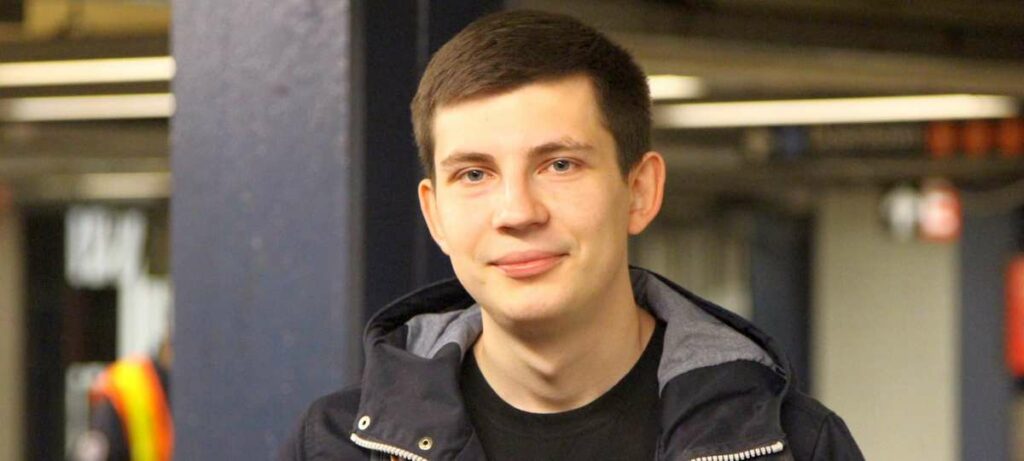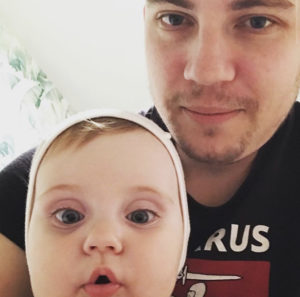The story of Ihar Losik
13 March 2021 | Vera Sauchanka, LiveFEED

Source: b-g.by
A 28-year-old journalist and blogger, Ihar Losik wasn’t supposed to be in prison. He was meant to keep covering news, spending time with his wife and daughter, and doing his part in building a better, brighter future. However, all of this would be in a parallel Universe. Not in Belarus.
Freedom of the press and peaceful assembly is something that we in the US often take for granted. Belarusians, on the other hand, never had these freedoms in the first place. Since 1994, the country is ruled by the incumbent president Alexander Lukashenko, also known as “Europe’s Last Dictator”. None of the Belarusian elections were recognized as free and fair, and the 2020 presidential election wasn’t an exception either.
When hundreds of thousands took to the streets to peacefully protest across the country, they were met with stun grenades and rubber bullets. During the ongoing unrest, at least eight protesters were killed, dozens went missing. There are at least 500 documented cases of torture by police and special forces. A full-blown repression machine was put on the move. Bloggers and journalists became its first targets. We spoke to Darya Losik about her husband and their life before and after.
“25 June was just a regular day. Around 11 am we went for a walk in the park with our daughter,” Darya shared.
As the founder of the country’s biggest political Telegram channel at the time, “Belarus golovnogo mozga” (“Belarus always on my mind”), Losik was of particular interest to the authorities. But he still didn’t know the walk on that summer morning would be the last one he’ll share with his family in 2020.
By the time they were back, the police were already waiting by their apartment. They showed the search warrant signed by the Deputy Prosecutor General. Shortly thereafter, they took Ihar, and Darya has not seen him ever since.
“All of our legal pathways have been exhausted. All of our petitions, complaints, and complaints on complaints were denied. Frankly, we filed them only because we had to try, even though everyone knew they wouldn’t let Ihar go. Unfortunately, it’s not working like this in Belarus.”
At first, Ihar was charged with Art. 342 of the Criminal Code (“Organization and preparation of actions that grossly violate public order”).
“By law, the term of the preliminary investigation on these charges cannot be longer than six months, and they were supposed to release him by 25 December 2020. Instead, they didn’t find anything ‘smarter’ than bring up new charges (Art. 293 – ‘Participation in riots’), and it’s an imprisonment of up to eight years,” Darya noted.

Source: photo courtesy of Darya Losik, LiveFEED
As a protest against the injustice, on 15 December Losik started a hunger strike, demanding either to release him or at least to change the term of his pre-trial detention so he can see his wife and daughter. He went without food for over 40 days.
During our interview, Darya showed a box of letters from Ihar and a portrait that his cellmate drew. Darya says it’s now the only way for her to know how her husband looks, since they were denied the right to see each other.
On 11 March, Ihar Losik was charged with a new article. As of now, it’s still unclear, which one. After hearing about the new charges, he tried to slit his wrists in front of the investigator and his attorney. Ihar went on a dry hunger strike to protest the new charges.
As of 14 March, Ihar is one of 285 political prisoners that remain behind bars in Belarus. Additionally, there are over 900 criminal cases against those who participated in the protests. More than 35,000 people were detained, arrested and jailed in Belarus since the widely disputed presidential election of 9 August 2020. This is the highest number in Europe within the past 40 years, and it keeps growing as the protests continue.

Source: courtesy photo, LiveFEED
Internationally recognized as “the elected leader”, Ms. Sviatlana Tsikhanouskaya has designated 7 February as the global Day of Solidarity with Belarus. This day also marked six months of mass peaceful protests after the widely disputed presidential election that claimed the reelection of Mr. Lukashenko to a sixth term in office, despite the evidence of widespread voter fraud.
To commemorate this day, hundreds of rallies took place in Belarus and across the world.
“We stand in solidarity with the Belarusian people and continue to be inspired as, week after week, so many take to the streets to demand the right to chart their own future. It is far past time the illegitimate Lukashenko regime step down, allow new, free and fair elections to be held, and release all political prisoners. We are fully committed to working with our transatlantic allies to support the aspirations of the people of Belarus in their pursuit of democracy, human rights, the rule of law and continued respect for their country’s sovereignty,” said Lead Republican of the House Foreign Affairs Committee Michael McCaul and Chairman Gregory W. Meeks in a joint statement.
“Spring is sure to come after winter, night gives way to dawn. No one was able to stop history by some decrees, arrests, or executions,” Losik wrote in his 25 January letter from prison.
See more in our video interview with Darya Losik.